#Assembly Election Voting
Text

#T_T#i don't know whether to scream * cry * or murder someone#the next person who tell me that voting for RN asshole was the right thing to do#to punish Macron#will find my punch#elections#european elections#europe#france#macron#and we're still waiting for Italy#this is a litteral nightmare#european parliament#french national assembly#what next
285 notes
·
View notes
Text
Hey, everyone, I'm so sorry I've been absent for a while, I've been dealing with some shit that's kept me pretty preoccupied. I promise to be back posting more regularly soon. But I did want to stop by and share a video I found tonight on Threads, because it's absolute perfection. I have no idea who created it, unfortunately, but if I do find out who the genius is, I'll edit this post to give them credit.
#presidential election 2024#kamala harris#harris 2024#vote kamala#vote harris#marvel#mcu#avengers endgame#avengers assemble#vote in november#vote as if your life depends on it#because it does
24 notes
·
View notes
Text
Ladies, vote for yourself and those denied the right
Dhurnal (Pakistan) (AFP) – Perched on her traditional charpai bed, Naeem Kausir says she would like to vote in Pakistan's upcoming election -- if only the men in her family would let her.
Issued on: 05/02/2024 - 08:41
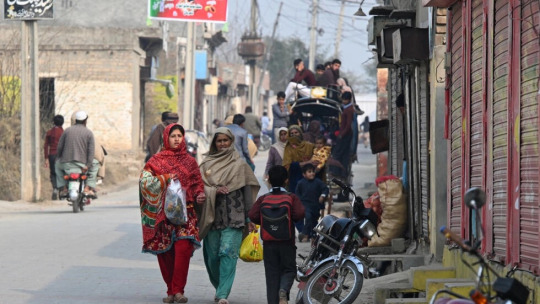
In the village of Dhurnal in Punjab, spread across crop fields and home to several thousand people, men profess myriad reasons why women should not be allowed to vote © Farooq NAEEM / AFP
Like all the women in her town, the 60-year-old former headmistress and her seven daughters -- six already university educated -- are forbidden from voting by their male elders.
"Whether by her husband, father, son or brother, a woman is forced. She lacks the autonomy to make decisions independently," said Kausir, covered in a veil in the courtyard of her home.
"These men lack the courage to grant women their rights," the widow told AFP.
Although voting is a constitutional right for all adults in Pakistan, some rural areas in the socially conservative country are still ruled by a patriarchal system of male village elders who wield significant influence in their communities.
In the village of Dhurnal in Punjab, spread across crop fields and home to several thousand people, men profess myriad reasons for the ban of more than 50 years.
"Several years ago, during a period of low literacy rates, a council chairman decreed that if men went out to vote, and women followed suit, who would manage the household and childcare responsibilities?" said Malik Muhammad, a member of the village council.
"This disruption, just for one vote, was deemed unnecessary," he concluded.
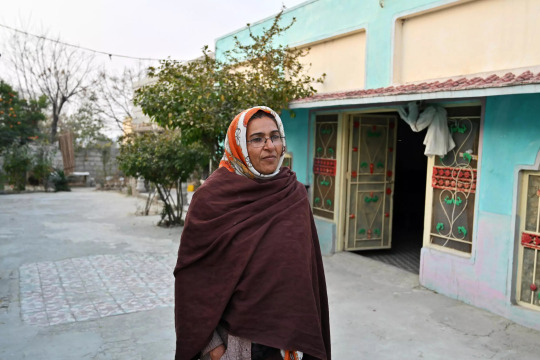
Robina Kausir, a healthcare worker, talks to AFP in Dhurnal of Punjab province, ahead of the upcoming general election © Farooq NAEEM / AFP
Muhammad Aslam, a shopkeeper, claims it is to protect women from "local hostilities" about politics, including a distant occasion that few seem to remember in the village when an argument broke out at a polling station.
Others told AFP it was simply down to "tradition".
First Muslim woman leader
The Election Commission of Pakistan (ECP) has stressed that it has the authority to declare the process null and void in any constituency where women are barred from participating.
In reality, progress has been slow outside of cities and in areas that operate under tribal norms, with millions of women still missing from the electoral rolls.
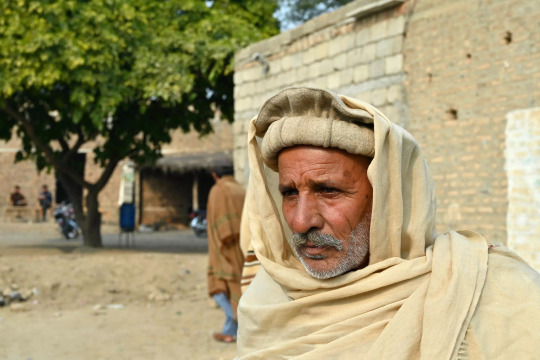
Muhammad Aslam, a shopkeeper, claims a ban on women voting is to protect them from "local hostilities" about politics © Farooq NAEEM / AFP
The elders in Dhurnal rely on neighbouring villages to fill a government-imposed quota which maintains that 10 percent of votes cast in every constituency must be by women.
Those who are allowed to vote are often pressured to pick a candidate of a male relative's choice.
In the mountainous region of Kohistan in Khyber Pakhtunkhwa province home to almost 800,000 people, religious clerics last month decreed it un-Islamic for women to take part in electoral campaigns.
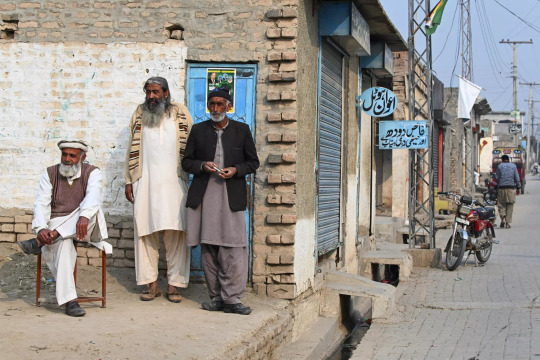
Although voting is a constitutional right for all adults in Pakistan, some rural areas in the socially conservative country are still ruled by a patriarchal system of male village elders who wield significant influence in their communities © Farooq NAEEM / AFP
Fatima Tu Zara Butt, a legal expert and a women's rights activist, said women are allowed to vote in Islam, but that religion is often exploited or misunderstood in Pakistan.
"Regardless of their level of education or financial stability, women in Pakistan can only make decisions with the 'support' of the men around them," she said.
Pakistan famously elected the world's first Muslim woman leader in 1988 -- Benazir Bhutto, who introduced policies that boosted education and access to money for women, and fought against religious extremism after military dictator Zia ul-Haq had introduced a new era of Islamisation that rolled back women's rights.
However, more than 30 years later, only 355 women are competing for national assembly seats in Thursday's election, compared to 6,094 men, the election commission has said.
Pakistan reserves 60 of the 342 National Assembly seats for women and 10 for religious minorities in the Muslim-majority country, but political parties rarely allow women to contest outside of this quota.
Those who do stand often do so only with the backing of male relatives who are already established in local politics.
"I have never seen any independent candidates contesting elections on their own," Zara Butt added.
'Everyone's right'
Forty-year-old Robina Kausir, a healthcare worker, said a growing number of women in Dhurnal want to exercise their right to vote but they fear backlash from the community if they do -- particularly the looming threat of divorce, a matter of great shame in Pakistani culture.
She credits part of the shift to access to information as a result of the rising use of smartphones and social media.
"These men instil fear in their women – many threaten their wives," she told AFP.
Robina, backed by her husband, is one of the few prepared to take the risk.
When cricketing legend Imran Khan swept to power in the 2018 election, Robina arranged for a minibus to take women to the local polling station.
Only a handful joined her, but she still marked it as a success and will do the same on Thursday's election.
"I was abused but I do not care, I will keep fighting for everyone's right to vote," Robina said.
#pakistan#Every vote counts#Men making up bs to prevent women from voting#Election Commission of Pakistan (ECP)#Men protecting women........from exercising their right to vote#Benazir Bhutto#only 355 women are competing for national assembly seats in Thursday's election compared to 6094 men
62 notes
·
View notes
Text

leftist union politicians have made an asmr video about their program 😭
#this is probably one of the weirdest political moment in france rn#(these are the good guys btw. macron dissolved our national assembly when he saw that his party didn’t get a lot of votes at the EUelections#and miraculously the left united almost seamlessly behind a common project to try and give us as big a chance as possible to have a majority#and therefore a left wing government. first round of these elections are on sunday and im shitting myself!#we're either getting the left wing or the front national racist fascists)
5 notes
·
View notes
Text
Trying to explain the current French politics to people who aren't French is a nightmare
#quick summary‚ our president disolved the national assembly after the racist extreme right-wing party he has beef with won the EU elections#not because they're racist but because he has beef with them. just to be clear. the two parties are having a massive slapfight.#a pathetic but very worrying slapfight#(national assembly being... the French equivalent of Congress from what i understand)#so i was reading the pamphlets of all the different candidates trying to figure out who i was gonna vote for...#...and rambling about it to my (usamerican) qpp#i just wish i had other french people to talk to about politics but my IRL friends arent really into politics#and tbh our politics dont. seem to. align that well. last time we talked politics they said their favorite candidate was their fav because.#...he ''seemed really funny and nice''#respectable but dude youre a portuguese bisexual enby. this guy's religiously right-wing#and my other french friend cant vote yet‚ so. sigh#rant#cw politics#might delete later?
2 notes
·
View notes
Note
i went to vote at 9am so i wasn't expecting crowds that early but it was still upsetting that there was no waiting at all. i just came in and voted in a few minutes. it was so empty.
omg same, I went at the beginning of the afternoon and thought there would be at list a little bit of a queue but there was just one person before me and one person in the booth and when I left there were maybe two people??? and I live in a very residential area of the capital! the far right has gotten a lot of votes from young people here but they're also the demographic group who voted the least... it's kind of depressing to see such a gap. I get why people would be unmotivated or disappointed but that's precisely why it's necessary to vote
#I'm really scared that not many people will go vote for the national assembly elections especially on such short notice#mutuals#taeminnoemuyeppeo#I've got mail
2 notes
·
View notes
Text
oh boy it’s bad
#so dude dissolved the assembly because the RN (far right)#got 31% of the votes in today’s european election#which is bad like huge loss for every single one of us the morons who voted for them included#(for the usual reasons but also they’re very anti-EU)#so i guess he took it as a challenge#and decided to fast forward the legislative elections by 3 years#as a way to show that we’d still rather have him and his goons rather than the RN in power#which is how he’s been elected twice btw#politics#france#assemblée nationale#european elections
4 notes
·
View notes
Text
I hate this fucking country
#far right won the European election#and our president decided to dissolve the nationnal assembly so we will have to vote for representatives again#we're screwed if far right win this one too#I hope the other countries did better I didn’t watch yet
2 notes
·
View notes
Text
50 % German, 50 % French, 1000000 % want to die
#eu elections#rn at one third and cdu & afd combined at about half of all votes?!?!?#what. the. fuck. is. wrong. with. this. continent!!!#also apparently macron is dissolving the national assembly which is perhaps THE WORST thing to do right now???#staying in power would at least keep the rn from officially seizing the country for another 3 years#now it's all but guaranteed to start this year#i'd say the british had the right idea but it's even worse there ahahahahaha
5 notes
·
View notes
Text
what if i killed myself
#i'm not even kidding macron dissolved the national assembly and we're gonna have to vote again and he knows the far right is gonna win so#we're gonna have one of them for prime minister#he knows it and he doesn't care because he has no principles he wants them to suck so everyone can see that they suck (they're not gonna#suck as much as he thinks they're gonna suck because this is their chance) so no one votes for them in 2027 and one of his bffs is#elected president in 2027#killing myself killing myself killing myself#killing myself#killing myself killing myself#and like i say: brf slt
4 notes
·
View notes
Text
When voters cast their ballots in the upcoming April election, they will, in nearly all Illinois communities, select one candidate per race. That could change under legislation proposed in the Illinois General Assembly.
At a House Ethics and Elections Committee hearing this week, two bills were discussed that would bring ranked choice voting to the state. The format, where voters select a first, second, third, and so forth candidate, has gained traction recently in states such as Alaska.
Evanston, home to Northwestern University, became the first city in the state to adopt RCV. A November referendum passed overwhelmingly and would apply to municipal races.
The bills - House Bill 2807 from state Rep. Maurice West, D-Rockford, and House Bill 3749 from state Rep. Kam Buckner, D-Chicago - focus on presidential primaries, and municipal and township office races respectively.
Former Colorado House Speaker Terrance Carroll, now a senior fellow at FairVote, a national nonprofit promoting RCV and election reform, told lawmakers the system would benefit voters in Illinois and nationwide.
Carroll promoted RCV as a way to move past personal attacks commonplace in political campaigns and instead focus on the issues. He said assertions that the elderly and people of color would not understand the process were false and offensive.
"For someone who has been involved in party politics, probably far longer than I should have been in my life, it also helps promote more viable candidates who are running for office," he said, serving as the first Black House Speaker in Colorado from 2003 through 2011. "So, it tends to mitigate against the most extreme candidates in both parties."
Opponents have submitted more witness slips than proponents on both bills as of Wednesday. Among them is Andy Bakker, representing the Illinois Opportunity Project and Stop Rank Choice Voting Coalition in Illinois, who spoke to the committee on Tuesday.
RCV would be a "radical change" to the way Illinoisans vote, and he questioned the benefits Carroll mentioned.
"At the end of the day, rank choice voting is a scheme to disconnect elections from issues and allows candidates with marginal support to win," Bakker said. "It obscures true debate and issue-driven dialogues among candidates and eliminates genuine, true binary choices."
HOW DOES IT WORK?
Instead of one choice, voters in a ranked-choice system select their first choice among a list of candidates and then choose their subsequent second, third, and potentially fourth options.
Under RCV, a candidate automatically wins if they receive a plurality of votes as a first choice. However, in cases such as the recent Chicago mayoral race where no candidate secured a majority, an elimination process would begin.
The candidate with the lowest number of votes would be eliminated and each of their votes reallocated to their supporters’ second choice candidate. The process would repeat until one candidate secured more than 50% of the votes.
Amber McReynolds, a senior political strategist with Issue One, said that based on RCV data from states such as Alaska, New York, and California that already use RCV, voter turnout has improved while helping to manage a large field of candidates.
"This is a better voting model to ensure all voices and choices are reflected in the election results," she said, an Illinois native also visiting from Colorado.
WHAT COUNTIES ARE PREPARED TO IMPLEMENT?
Neither HB 2807 nor HB 3749 have effective dates nor have been moved out of committee, but McReynolds thinks if passed, the legislation could be quickly implemented.
More than 80% of Illinois voters live within a jurisdiction that has the systems and software to use RCV, she said. But more than a third of counties would require updates.
State Rep. Dennis Tipsword Jr., R-Metamora, raised concern about the expense of updating election systems for rural counties.
Julie Bliss, county clerk in Boone County, told committee members part of the increased expense is that ballots will be larger. It also depends on what voting software is used. Bliss added every Illinois county has a separate contract with voting companies.
States such as Vermont, Georgia and Rhode Island that have statewide contracts reduce costs and give voters a more uniform experience regardless of county, she said.
The expense estimated for Boone County, home to about 53,000 residents, ranges from $35,000 to $45,000 to purchase the needed software upgrade, she said.
Sangamon County Clerk Don Gray confirmed an upgrade to the county's Election Systems and Software would cost about $1.8 million. However, a system upgrade only would be part of the expenses, he said. Sangamon County also would need to account for increased printing costs due to larger ballots, certification with state and federal election authorities, a software update, and educating the public on what RCV means.
Aggregating election software at the state level could help with costs, but Gray said he would like to know what that means for security measures. He also noted that counties such as Cook which uses Dominion Voting Services for its tabulation, have different needs and financial abilities when it comes to elections.
"The decentralized factor of how we operate today is a great security feature, especially in the age of cybersecurity."
"Our opponents that would like to be nefarious to the system ... have to access multiple points instead of a single, universal centralized system."
With limited data on the expense, state Rep. Carol Ammons, D-Urbana, urged more research be conducted before the legislature moves forward with RCV statewide. Like Bliss, she also supported a statewide voting system.
"I understand the idea, I understand it works in other places, but I understand our process does not collect the proper data for us to analyze," she said.
#us politics#news#the state-journal register#Illinois#Illinois General Assembly#2023#ranked choice voting#election reform#Illinois House Ethics and Elections Committee#House Bill 2807#House Bill 3749#Maurice West#Kam Buckner#Terrance Carroll#FairVote#Andy Bakker#Illinois Opportunity Project#Stop Rank Choice Voting Coalition in Illinois#Amber McReynolds#Issue One#Dennis Tipsword Jr.#Julie Bliss#Don Gray#Carol Ammons
12 notes
·
View notes
Quote
Pre-poll surveys, exit polls, and analyses of election results emerging from Karnataka have all made it apparent that the highest preference for the right-leaning BJP – which, at least symbolically, frowns upon freebies – was shown by the wealthiest and most educated segment. Preference for the left-leaning Congress and JD(S) – which campaigned on the plank of welfare schemes – increase as we proceed to the poorer and less educated segments. Three of the four districts in Karnataka where the BJP managed to win a majority of the Assembly seats are Bengaluru Urban (16/28), Dakshina Kannada (6/8), and Udupi (5/5), districts that constantly top the Human Development Index and per-capita income rankings in the state, statistics that indicate a higher concentration of the rich. Everywhere else, the Congress and the JD-S won a majority of the seats. This dissonance in the voting pattern can be attributed, at least in part, to the increasing inequality between the rich and the rest, in Karnataka and across India.
Rakshith Ponnathpur, ‘The rich, the rest and freebies: Unpacking a problematic narrative’, Deccan Herald
#Deccan Herald#Rakshith Ponnathpur#2023 Karnataka Assembly elections#Karnataka#BJP#INC#JD(S)#Bengaluru Urban#Dakshina Kannada#Udupi#Human Development Index#per-capita income#voting pattern#inequality#India
5 notes
·
View notes
Text
Something really amazing happened in France, and I think it'd help us in the US to learn about it. Forgive the long read, but I think this is genuinely great both because of what happened and how.
So as some of you might have seen, in a decision historians will debate for years (mostly to figure out just WTF he was thinking, even though he is alive right now and can be asked), the French president, Emmanuel Macron, currently in power and THREE YEARS before the scheduled election, seeing the far right rise in popularity decided to dissolve the assembly and hold snap elections.
577 seats were up for grabs. Remember that number. Since half of that is 288.5, 289 seats are needed for a majority.
The first round happened last week and boy, was it bad. The far right made HUGE gains. It won or was in first place in so many races. And Macron's party ended up third!
Overall, this is how things ended up after the first round:
Far right bloc: 33%
Left bloc: 28%
Macron's centrist party: 20%
Conservatives: 7%
The way the French system works is that if a candidate gets over 50% of the vote, they win outright, and some of the far right did manage that. But, many races went to a runoff.
Immediate projections after were that the far right bloc might win anywhere from 240 to 310 seats, a catastrophe.
A shameful swing to the far right leading to the first time they'll be in power since the 1940s? Yes, but maybe not??
This is where things get interesting.
Unusually, a lot of these runoffs are 3-way, instead of a simpler 2-way choice. And in pretty much every case, that helps the far right.
So on June 30th, the night of the first round, this is how things went down:
Immediately, the left parties put out the call: anywhere they were third, they withdrew and their voters would go over to whoever was running against the far right candidate. Their goal: form a "republican front" to block the far right. The far right cannot get 289 seats.
Macron's bloc was not so...motivated. Different people put out different instructions: in some places, if they were third, they should drop out, but only to help the center left, not far left, in other places, see how far you are, only then drop out, that kind of thing.
The conservative party simply said they won't drop out and won't give their voters instruction either way in races they're not involved in.
Late night developments:
More people in Macron's party are now beginning to realize the situation and starting to coalesce around whichever candidate can beat the far right one. Prime Minister Gabriel Attal, from Macron's party, says clearly the priority is to block the far right. BUT, some Macron spokespeople on TV say they'll form a coalition only with the center left and conservatives, splitting the left bloc if needed. Some individual Macronists still saying they won't drop out, even if there's no hope of winning.
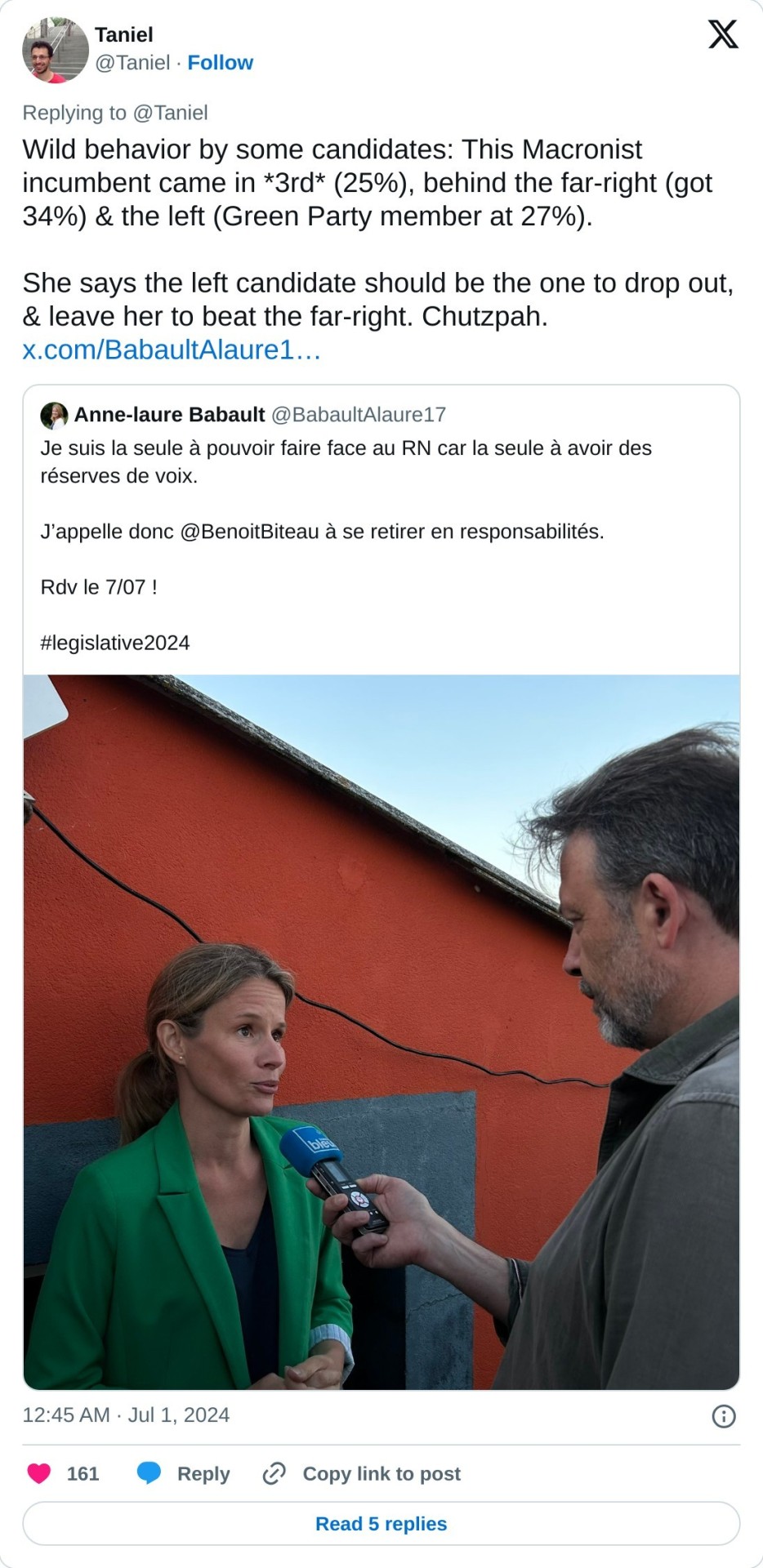
Lol.
So, now July 1st:
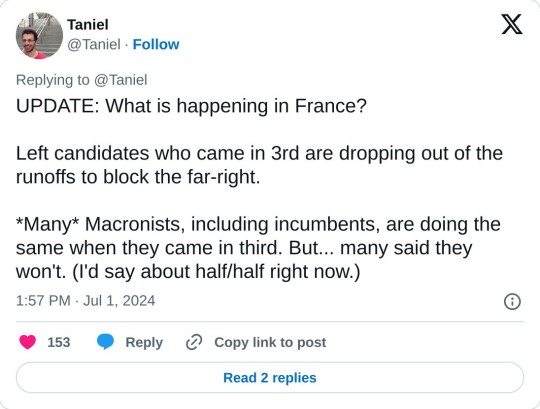
Only half so far. In one race, where the sister of Marine Le Pen (the far right leader and the face of their movement) was leading, the third place Macronist refused to bow out.
Excellent quote from another Macronist:
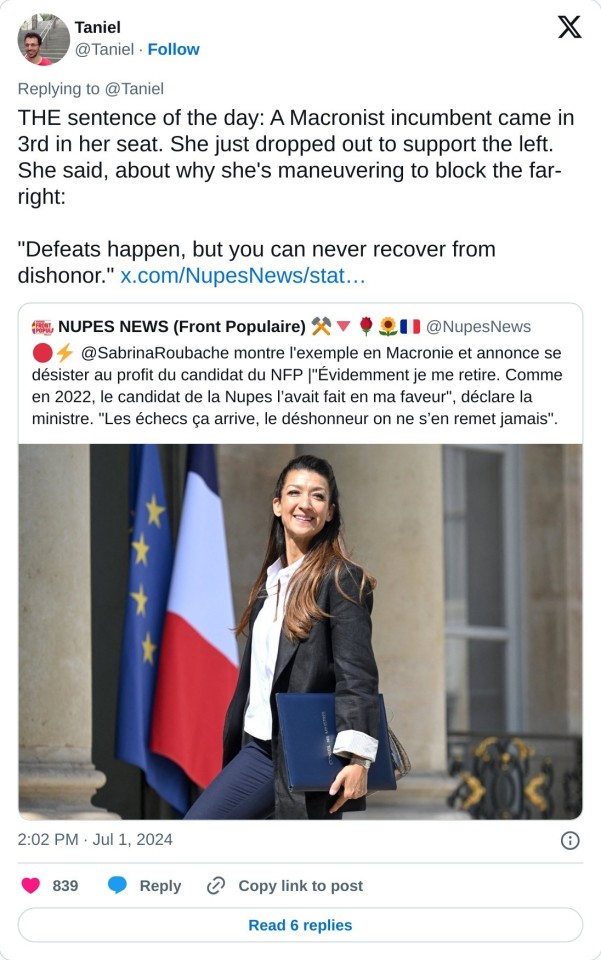
Perhaps realizing the same thing, that Macronist in the race against the Le Pen sister now drops out.
In some places, third place Macronists are dropping out DESPITE Macron bewilderingly telling them NOT to?
Halfway through the day:
Of the 311 3-way or 4-way runoffs, the number is down to 135 because of these candidates dropping out: 121 Left, 56 Macronists, 1 conservative.
Oh, there was this, in case people had any doubts about how terrible the far right are:
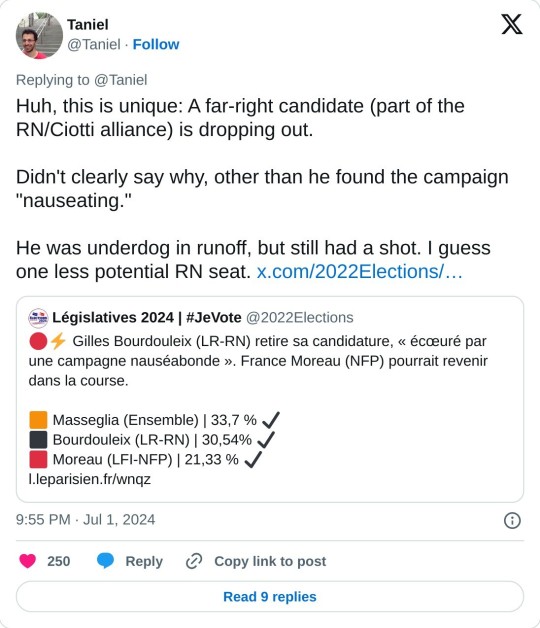
And to show the selflessness of the left:
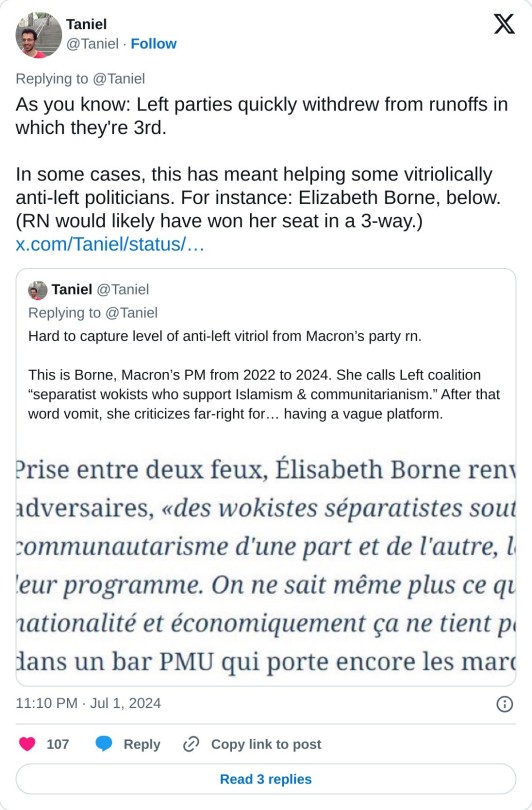
July 2:
The deadline to decide if they want to stay in a runoff is today.
A dozen new third place Macronists who said they'd stay in have now dropped out. One got a call from both the PM Attal AND Macron to drop out, signalling the dawning understanding of the importance of this moment.
Even some conservative party members are now backing the left candidate who faces the far right.
A Macronist who had 30.55% of the vote in the first round and came in third to the far right's 33.11% and left's 32.73% and who would have been tempted to stay has dropped out.
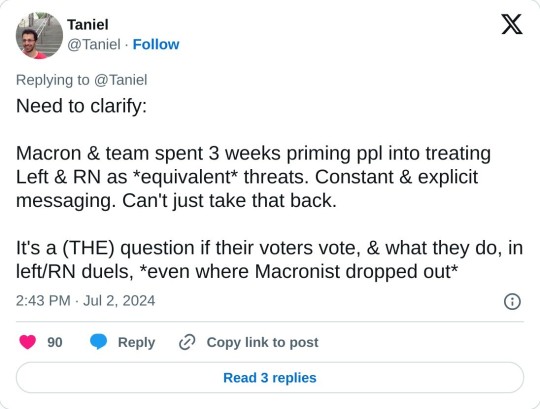
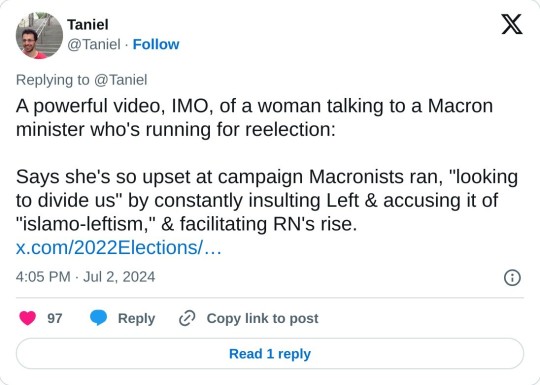
The deadline to stay in or not has now passed.
Look at these far right shenanigans!
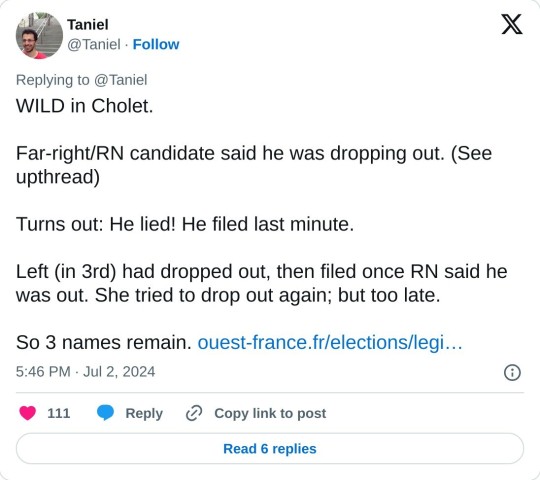
Macron still being a freaking loser:

July 3rd:
In the end, of the 311 3- or 4-way run offs, only 91 left. Some polls come out that have the far right getting between 190 to 220 seats.
July 4th:
New polls say the balance of the voting itself isn't transferring between the left and center and predictions have risen for the far right, now predicted to get between 210 and 250 seats.
July 5th:
New polls again, left voters now predicted to do better transferring vote to the centrists, decreasing the far right projections again.
However, scandalous reporting emerges: while Attal was trying to fend off the far right, Macron was not only NOT taking the far right seriously, he was undermining efforts to defeat them. His team shrugged off the first round results and celebrated a BIRTHDAY as the results were still coming in?
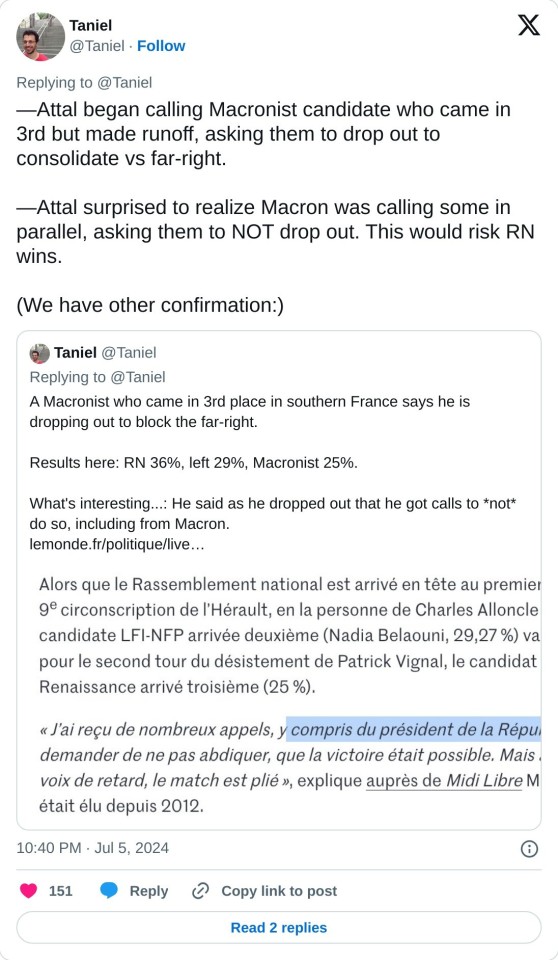
July 6th:
A few runoffs happened yesterday, nothing much unexpected, some left and center wins.
July 7th:
The day of reckoning. At this point, the expectations are that the far right won't come close to that 289 number but could still easily have the most seats.
GUYS.
It's over and the left are in the lead!

A LOT of cases where a leftist or centrist was 2nd in the first round and now won.
Amazing:
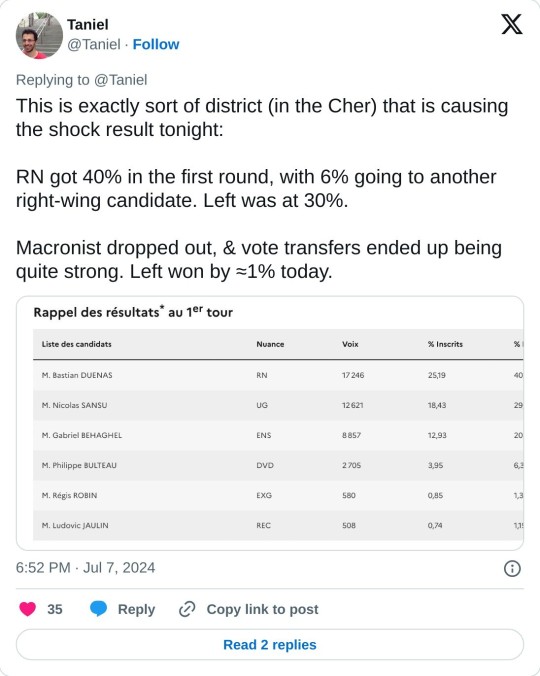
SO many lessons to take from this.
First, you have to vote! You have to. You can't do anything without voting. The freaking French, who'll protest for anything, are showing up to vote. If you're trying to achieve any kind of result and it's not going to happen by January 2025, you have to vote now.
But just as importantly, the left and center (and even conservative) parties made very key decisions. They were all lucky that Attal, who Macron chose, saw the big picture, bigger than indeed Macron could. A stupid selfish centrist leader could have still ruined everything if it were up to him.
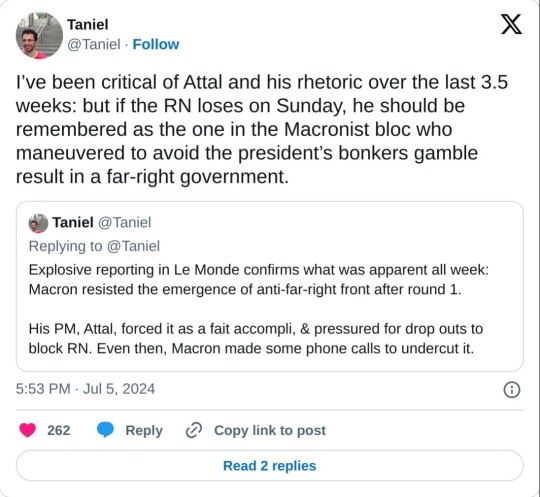
TL;DR: After a disastrous first round in the national French elections where the far right was on the cusp of taking power, the left and center formed a strong coalition and through the power of voting and unity, overcame the far right AND their selfish centrist president to win.
#french elections#us elections#emmanuel macron#marine le pen#gabriel attal#attal really did the thing for them#french politics
15K notes
·
View notes
Text
मां वैष्णो देवी की कसम, भाजपा को वोट नहीं देंगे; विधानसभा चुनावों से पहले बगावत, सामूहिक इस्तीफे की दी धमकी
Jammu Kashmir News: भारतीय जनता पार्टी (भाजपा) की जम्मू-कश्मीर इकाई में विद्रोह खुलकर सामने आ गया है। 18 सितंबर से शुरू होने वाले आगामी विधानसभा चुनावों में टिकट बंटवारे को लेकर पार्टी नेता और उनके समर्थक आमने सामने हैं। जम्मू-कश्मीर भाजपा प्रमुख रविंदर रैना को रोहित दुबे और उनके समर्थकों को शांत करने के लिए कटरा जाना पड़ा। रोहित दुबे के समर्थक उनको टिकट नहीं दिए जाने को लेकर गुस्सा हैं। दरअसल…
0 notes
Text
Water Crisis Sparks Protest March in Bagbera
Residents threaten voting boycott over 9-year delay in rural water supply scheme
Bagbera locals organized a protest march against the prolonged delay in implementing the Rural Water Supply Scheme.
JAMSHEDPUR – Bagbera residents staged a padyatra to protest the 9-year delay in implementing the Rural Water Supply Scheme.
Frustrated citizens, led by North-East Bagbera Panchayat Deputy Mukhiya Suresh…
#assembly elections#जनजीवन#Bagbera protest#civic amenities protest#Jamshedpur Infrastructure#Kishore Yadav#Life#padyatra in Bagbera#Rural Water Supply Scheme#Suresh Nishad#voting boycott threat#water crisis in Jharkhand
0 notes
Text
This is fantastic!

#i’m with her#cat ladies assemble#please vote#women’s rights#vote blue#election 2024#body autonomy#girl power
1 note
·
View note